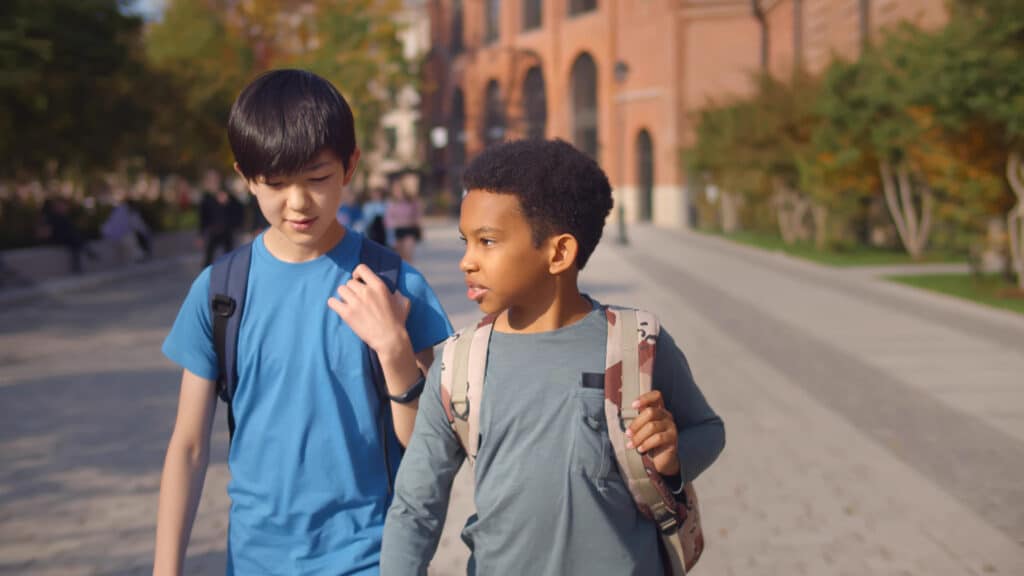How Can I Help My Kids Make Friends?
Teaching kids in-person conversational skills to create meaningful real-life connections
AUG 03, 2022
How Can I Help My Kids Make Friends?
Teaching kids in-person conversational skills to create meaningful real-life connections
Social connection is a basic human need [1]. Kids are hardwired to make friends and fit in with their peers. These desires manifest when kids are as young as three years old [2].
While tech has a place in friendships, it can’t replace bonding in real life.
Face-to-face interactions can be supplemented with technology and online activities, such as chatting with relatives who live far away. Still, while tech has a place, it can’t replace bonding in real life.
Spending too much time online can lead to loneliness and a sense of isolation for kids.
All kids desire real-life friends, but children struggle to know how to make and maintain relationships with their peers. Naturally, we want to help.
While we can’t make friends for our kids, there are things we can do to teach them how to thrive in social situations.

Benefits of Friendship
Forming friendships with other kids is an important part of child development and yields big gains. For instance, friendship raises self-esteem and improves it more than self-esteem training can [1].
Learning how to connect with other kids through conversation is one of the most important skills parents can teach their children.
Positive friendships can also protect kids from bullying, teach empathy and altruism, refine collaboration skills, and even promote better behavior through positive peer pressure [1].

Four Conversation Skills That Can Help Kids Make Friends
As with any other social skill, learning how to make friends can be learned. Just because a child struggles with this now, doesn’t mean they always will.
While many competencies can contribute to a child’s ability to make friends, learning how to connect with other kids through conversation is one of the most important.
Consider the following conversation skills you can work on with your child to help them feel more comfortable making and maintaining friendships.

Skill #1: Finding shared interests
Shared interests are the base of many friendships [4]. Identifying common ground gives young people something to talk about and do with potential friends.
Children can find common interests by listening to their peers and volunteering things about themselves. Listening and sharing can be tricky, but kids can become experts with practice.
Conversation Practice: Helping Kids Listen and Share
Invite your child to play the “One New Friend a Day” game.
Every day, the child will look for an opportunity to make a new friend with someone their age. To do this, they will ask a peer three questions and share one thing about themselves.
Parents can provide questions (“What is your favorite recess game?” for instance) or leave it up to the child.
At the end of the day, the child can tell their parents what they learned about their new friend and discuss how the exchange went.
Skill #2: Giving compliments
Kids enjoy hanging out with children who make them feel good about themselves. Compliments are a great way to do this [3].
Compliments can be a useful tool to nurture and enhance relationships. Ultimately, it contributes to a deeper, more intimate connection.
—Lindsay Liben, LCSW
Kids who want to make more friends can benefit from observing other kids and looking for things they can admire. Keep compliments genuine and simple, so they’ll be perceived as more sincere.
Using phrases like “You’re good at the monkey bars” or “I like your hair today” can go a long way.

Skill #3: Doing nice things
Doing small acts of service for other children is another way to attract friends [3]. Just like giving compliments, it makes others feel good about themselves and want to be around you.
Similarly, acts of kindness that are too big can end up backfiring. Rather than making the other child feel valued and appreciative, it can actually make them feel uncomfortable with pressure to return the favor [3].
Try sitting next to someone who doesn’t have anyone by them or sharing a toy. Kindness is a characteristic that matters to others.
It doesn’t take much to make someone else feel good.
Skill #4: Giving space
Help kids learn to give new friends an appropriate amount of space. Smothering peers with continuous conversation or shadowing them around at recess can be off-putting and damage budding friendships.

Ideas for Practice
Parents can talk about and even practice conversational skills with their children just by regularly communicating with them.
Experts have long recommended eating together as a family for this purpose—the dinner table is a great place to chat.
Aside from school, there are many settings parents can place their little ones in to maximize opportunities for social interaction.
Opportunities for kids to socialize beyond the screen
- After-school clubs and activities
- Block parties or a neighborhood barbeque
- Community pools
- Playdates with other kids
- Playgrounds
- Skating rinks
- Sports leagues through a local Recreation Center
- Summer camps
- Summer reading activities at the local library
- Trampoline parks
Practicing with parents is helpful, but a child’s social skills will grow the most when they have opportunities to meet and interact with their peers.

Balancing Digital and Real-Life Relationships
Our need for quality social interactions makes friendships an important part of healthy development.
Even though online relationships can help meet some of their social needs, face-to-face friendships cannot be replaced.
Kids need balance in their digital lives.
For more information about how you can help your child build and maintain friendships, check out Dr. Eileen Kennedy-Moore and Christine McLaughlin’s book Growing Friendships: A Kids’ Guide to Making and Keeping Friends.
Also, sign up for the Gabb Family Newsletter to receive updates on best parenting practices directly to your inbox.




Success!
Your comment has been submitted for review! We will notify you when it has been approved and posted!
Thank you!